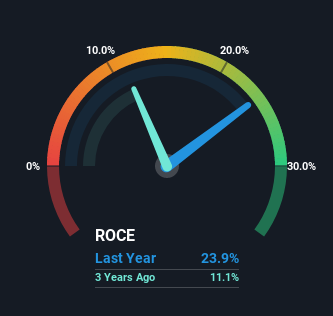- United Kingdom
- /
- Wireless Telecom
- /
- LSE:AAF
We Think Airtel Africa (LON:AAF) Might Have The DNA Of A Multi-Bagger

If we want to find a stock that could multiply over the long term, what are the underlying trends we should look for? One common approach is to try and find a company with returns on capital employed (ROCE) that are increasing, in conjunction with a growing amount of capital employed. Ultimately, this demonstrates that it's a business that is reinvesting profits at increasing rates of return. So when we looked at the ROCE trend of Airtel Africa (LON:AAF) we really liked what we saw.
Return On Capital Employed (ROCE): What Is It?
Just to clarify if you're unsure, ROCE is a metric for evaluating how much pre-tax income (in percentage terms) a company earns on the capital invested in its business. The formula for this calculation on Airtel Africa is:
Return on Capital Employed = Earnings Before Interest and Tax (EBIT) ÷ (Total Assets - Current Liabilities)
0.24 = US$1.7b ÷ (US$10b - US$3.1b) (Based on the trailing twelve months to September 2022).
So, Airtel Africa has an ROCE of 24%. That's a fantastic return and not only that, it outpaces the average of 9.3% earned by companies in a similar industry.
See our latest analysis for Airtel Africa

Above you can see how the current ROCE for Airtel Africa compares to its prior returns on capital, but there's only so much you can tell from the past. If you're interested, you can view the analysts predictions in our free report on analyst forecasts for the company.
The Trend Of ROCE
We like the trends that we're seeing from Airtel Africa. The data shows that returns on capital have increased substantially over the last five years to 24%. The amount of capital employed has increased too, by 56%. The increasing returns on a growing amount of capital is common amongst multi-baggers and that's why we're impressed.
On a related note, the company's ratio of current liabilities to total assets has decreased to 31%, which basically reduces it's funding from the likes of short-term creditors or suppliers. This tells us that Airtel Africa has grown its returns without a reliance on increasing their current liabilities, which we're very happy with.
The Bottom Line
To sum it up, Airtel Africa has proven it can reinvest in the business and generate higher returns on that capital employed, which is terrific. Since the stock has returned a solid 65% to shareholders over the last three years, it's fair to say investors are beginning to recognize these changes. So given the stock has proven it has promising trends, it's worth researching the company further to see if these trends are likely to persist.
If you want to continue researching Airtel Africa, you might be interested to know about the 1 warning sign that our analysis has discovered.
If you'd like to see other companies earning high returns, check out our free list of companies earning high returns with solid balance sheets here.
New: Manage All Your Stock Portfolios in One Place
We've created the ultimate portfolio companion for stock investors, and it's free.
• Connect an unlimited number of Portfolios and see your total in one currency
• Be alerted to new Warning Signs or Risks via email or mobile
• Track the Fair Value of your stocks
Have feedback on this article? Concerned about the content? Get in touch with us directly. Alternatively, email editorial-team (at) simplywallst.com.
This article by Simply Wall St is general in nature. We provide commentary based on historical data and analyst forecasts only using an unbiased methodology and our articles are not intended to be financial advice. It does not constitute a recommendation to buy or sell any stock, and does not take account of your objectives, or your financial situation. We aim to bring you long-term focused analysis driven by fundamental data. Note that our analysis may not factor in the latest price-sensitive company announcements or qualitative material. Simply Wall St has no position in any stocks mentioned.
About LSE:AAF
Airtel Africa
Provides telecommunications and mobile money services in Nigeria, East Africa, and Francophone Africa.
High growth potential slight.
Similar Companies
Market Insights
Community Narratives



